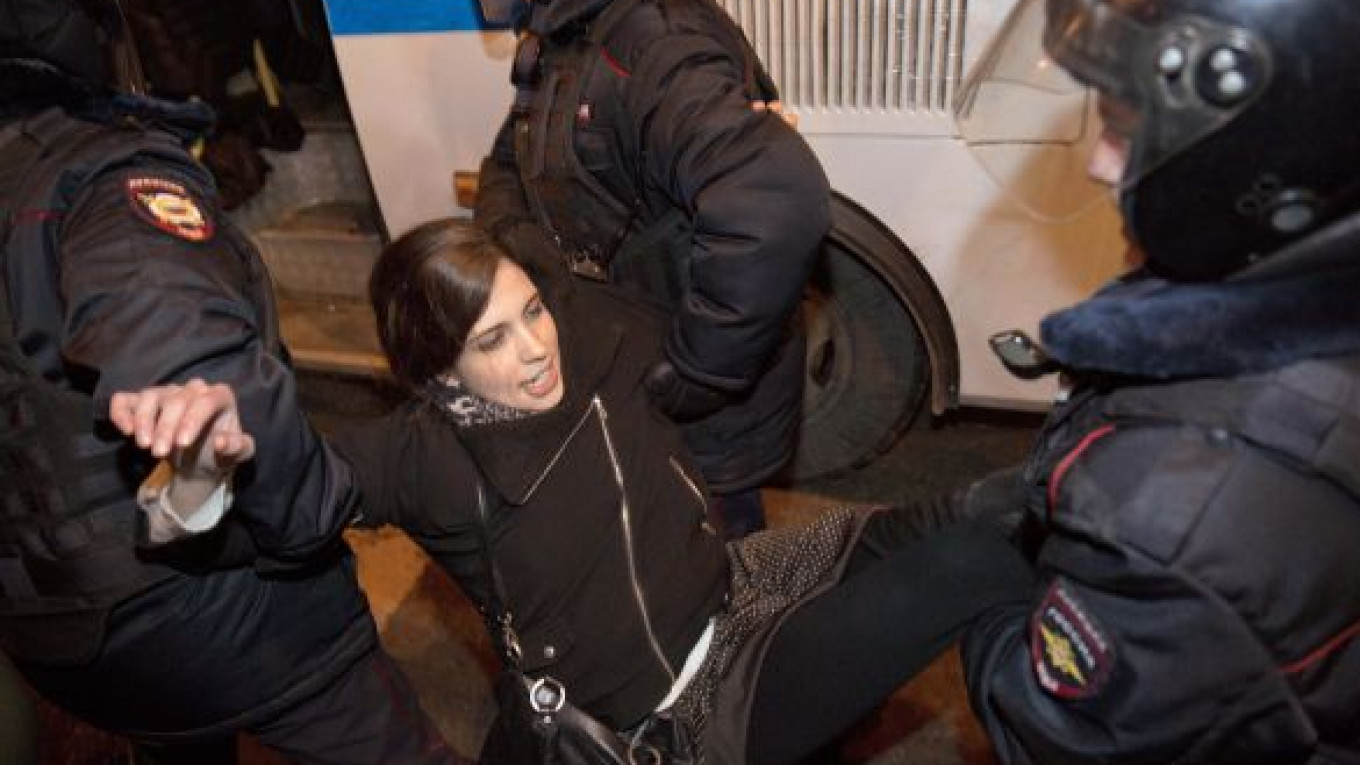A Moscow court on Tuesday sentenced three opposition leaders including Alexei Navalny as well as several other activists to jail sentences of up to 10 days for participating in an unauthorized rally near the Kremlin late Monday.
Up to a few thousand demonstrators gathered on Manezh Square to protest prison sentences given Monday afternoon to defendants in the Bolotnoye trial, in which eight people were convicted of participating in “riots” and attacks on police on Bolotnaya Ploshchad in May 2012. Police detained about 420 people who came to Manezh Square for the rally, among them Navalny and fellow anti-Kremlin figures Boris Nemtsov, Ilya Yashin and Pussy Riot members Nadezhda Tolokonnikova and Maria Alyokhina.
Moscow's Tverskoy District Court on Tuesday sentenced Navalny to seven days in jail and Nemtsov and Yashin to 10 days in jail each on administrative charges of failing to follow police orders for appearing at the unsanctioned protest.
“Ruled guilty. Arrest — 10 days,” Nemtsov wrote on Twitter. “Russia will be free! See you!”
Navalny's last tweet on Tuesday was posted about half an hour before the arrest order was issued for him.
The nonparliamentary opposition has long used the Bolotnoye case as a rallying point for its supporters, and opposition leaders sought to make a show of anger against the authorities with the Manezh Square protest. But Moscow security forces, likely having known about the planned demonstration long ahead of time from social media, closed off the square and surrounding areas to foot traffic in the early evening.
Lower-profile opposition campaigners Nikolai Lyaskin and Nadezhda Mityushkina on Tuesday were also given 10 days in jail each on administrative charges, fellow activists said on Twitter.
It was not immediately clear on Tuesday afternoon how many of the protesters detained in the vicinity of the Kremlin late Monday were to stand trial and how many had been released. Media reports said many were released after a short time, but repeated calls to city police seeking more information went unanswered Tuesday.
Michael McFaul, the outgoing U.S. Ambassador to Russia, on his last day in the post Tuesday, commented on Monday's detentions around Manezh Square, writing on Twitter that it was “discouraging to see hundreds of detentions of those trying to exercise their constitutional rights of freedom of speech and expression.”
But two representatives of Russia's human rights ombudsman Vladimir Lukin, who arrived at Manezh Square late Monday to monitor the unauthorized event, said Tuesday that they had “no particular reprimands about the actions of police” at the venue.
“We witnessed no obviously brutal or disrespectful treatment of demonstrators by police,” the ombudsman's office said in a statement on its website.
European Union foreign policy chief Catherine Ashton issued a statement late Monday criticizing the prison sentences handed down Monday to seven of the eight defendants in the Bolotnoye trial, calling them "disproportionate in light of the nature of the events and the offenses they are accused of.”
"The outcome of the trial, given the procedural shortcomings and long pre-trial detention … further raises concerns as to the impact of such trials on the exercise of freedom of expression and assembly in Russia," Ashton said in the statement posted on the website for the EU External Action Service. She called on Russia to overrule the sentences in order to "uphold its international human rights commitments."
Meanwhile on Tuesday, the trial of another two opposition leaders — Left Front movement head Sergei Udaltsov and his aide Leonid Razvozzhayev — continued at another Moscow court on Tuesday. The two are charged with staging alleged riots on Bolotnaya Ploshchad in May 2012 and having planned more riots for 2012, in collusion with Georgian opposition politician Givi Targamadze who allegedly sponsored them.
Contact the author at n.krainova@imedia.ru
A Message from The Moscow Times:
Dear readers,
We are facing unprecedented challenges. Russia's Prosecutor General's Office has designated The Moscow Times as an "undesirable" organization, criminalizing our work and putting our staff at risk of prosecution. This follows our earlier unjust labeling as a "foreign agent."
These actions are direct attempts to silence independent journalism in Russia. The authorities claim our work "discredits the decisions of the Russian leadership." We see things differently: we strive to provide accurate, unbiased reporting on Russia.
We, the journalists of The Moscow Times, refuse to be silenced. But to continue our work, we need your help.
Your support, no matter how small, makes a world of difference. If you can, please support us monthly starting from just $2. It's quick to set up, and every contribution makes a significant impact.
By supporting The Moscow Times, you're defending open, independent journalism in the face of repression. Thank you for standing with us.
Remind me later.






